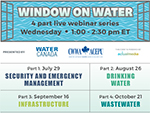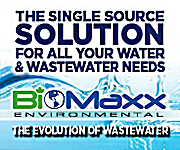 |
||||||||||||||||||||||||||||||
| Subscribe | Past Issues | www.cwwa.ca | Water Source Magazine | ||||||||||||||||||||||||||||||
|
CWWA News
By "we," I mean the Canadian water utility sector. After the last election the Prime Minister gave a mandate to the Minister of Environment and Climate Change to create a new Canada Water Agency. There wasn’t a lot of direction beyond that other than to work with the Minister of Agriculture and Minister of Fisheries. So what does that mean? What might be the scope and mandate of such an agency?
Over 200 people joined us for our Window on Water: Drinking Water event yesterday, the second in our four-part Window on Water webinar series. We’ve had two great discussions so far, featuring federal government officials and industry experts on the subjects of water security and emergency management and drinking water.
Federal Initiatives
Health Canada has several guidelines out for public consultation. CWWA’s Drinking Water Quality Committee is reviewing these guidelines and will submit comments when there are concerns. On July 16, 2020, the Government of Canada released the Strategic Assessment of Climate Change, July 2020 (SACC). The SACC includes rules and obligations that apply to designated projects under the federal Impact Assessment Act (IAA). In particular, the SACC outlines requirements for project proponents in relation to greenhouse gas (GHG) emissions as well as associated climate change information. In addition, the SACC will also work to guide non-designated projects such as those regulated by the Canada Energy Regulator (CER) or under regional assessments. The stated purpose of the SACC is to bring consistency, transparency, efficiency and predictability to the impact assessment process in the climate change context. The drinking water distribution system is the last protective barrier before the consumers' tap. A well-maintained and operated distribution system is therefore a critical component of providing safe drinking water. This webinar will present information included in a new guidance document prepared by Health Canada in collaboration with the Federal-Provincial-Territorial Committee on Drinking Water. Information to be covered includes: the direct and indirect health effects of water quality deterioration in the distribution system; factors that contribute to water quality deterioration; monitoring methods or parameters that are available to determine if water quality changes are occurring; and strategies that can be used to manage these changes. Practical applications of the suggested guidance will also be presented by two municipalities.
Collaborative mitigation, adaptation and resilience planning is required to “future-proof” the water sector against the many significant challenges and risks over the coming decades. This Webinar Workshop Series will examine vulnerabilities that must be addressed by collaborative planning on a local, regional, national and global scale pertaining to black swan events and overall water sector security. Applying a scenario planning approach, we will ‘red team’ the plausibility and solution space.
A panel of wastewater and public health experts has determined that occupational risk of COVID-19 infection for wastewater workers is low. The panel also found that standard wastewater treatment processes inactivate the virus and additional research should be conducted to further increase understanding of hazards and protections for personnel.
The Water SARS-CoV-2 RT-PCR Test is a real-time reverse transcription polymerase chain reaction (RT-qPCR) test that detects and quantifies RNA from the SARS-CoV-2 virus in untreated wastewater. Supported by an industry leader with over 20 years of experience manufacturing wastewater testing kits, public health departments, researchers, and laboratories can confidently deliver consistent results to help protect their communities. Member News
The Water Environment Federation (WEF) proudly announces the 2020 WEF Awards recipients for operational and design excellence. These awards recognize individuals and organizations that have made outstanding contributions to the water environment profession. CWWA congratulates all the winners, particularly Barry Orr who was awarded the Collection System Award. Barry has been a long-time collaborator with the Association, leading our efforts on flushable wipes and working to see national and international standards for flushable products.
Provincial News
On July 30, 2020, the Government of Canada announced $1.18 million to support 15 new projects under the Lake Winnipeg Basin Program. The projects will address key water-quality issues in the Lake Winnipeg basin, including addressing algae growth, enhancing collaboration throughout the basin, and engaging Indigenous Peoples in freshwater management.
The Ministry is proposing to modernize Ontario’s environmental approval process for low-risk municipal sewage works by implementing a Consolidated Linear Infrastructure Permissions Approach. The purpose of the Approach is to, among other things, reduce the regulatory burden for municipalities and developers by replacing existing individual pipe-by-pipe Environmental Compliance Approvals (ECAs) with one multi-media ECA for a municipality’s wastewater sewage collection system and one multi-media ECA for a municipality’s stormwater collection, treatment and disposal system. Comment deadline: August 22, 2020.
Snippings & Clippings
Environmental Science and Engineering Magazine (ESE) The City of Hamilton has experienced further delays on its massive wastewater treatment plant upgrades after discovering a “significant amount” of polychlorinated biphenyl (PCBs) in the soil around a new chlorine contact tank, a city staff report says. MLive The U.S. Environmental Protection Agency must face a lawsuit filed by Flint residents who claim their health was harmed because the federal government concealed, ignored, or downplayed the risks they faced during the city’s water crisis. Water Online More than four years since a federal state of emergency was declared over the high levels of lead contamination in Flint, MI, drinking water, the road to recovery is ongoing, but there may now be some relief in sight. Ozone Science and Engineering The removal of cyanotoxins, microcystin-LR (MLR), anatoxin-a (ANA), and cylindrospermopsin (CYN) in Detroit River water (DRW) was investigated by ozone and advanced oxidation process (AOP). Enhanced removal of all cyanotoxins was observed with increasing applied ozone dose. The reactivity of cyanotoxins with ozone followed the order of MLR>CYN>ANA in DRW at its natural pH of 7.6, as indicated by the calculated pseudo first-order oxidation coefficients (kd) of 17.5, 7.41, and 2.03 L/mg, respectively. The most efficient oxidations of MLR, CYN, and ANA with ozone in DRW were obtained at pH 5, 7.6, and 10, respectively, with kd values of 29.5, 7.41, and 4.65 L/mg. Ozone-based AOP with hydrogen peroxide did not make a significant difference in the removal of cyanotoxins compared to the application of ozone alone. Water Online The cost of water delivered to customers is as much about the energy needed to move it as the chemicals required to treat it. Balancing water chemistry, infrastructure costs, and energy consumption is key to optimizing the overall cost of operation. Experience shows that some astute water suppliers are closer to achieving their ideal outcomes than most people realize. Here are some insights into how that works. MSN Village Brewery, which describes its blond ale as crisp, dry and slightly fruity, is looking to persuade beer lovers that a new batch made from reused wastewater tastes just as good. International News
On July 29, 2020, the World Health Organization (WHO) issued its latest interim guidance on water, sanitation, hygiene and waste management relevant to viruses, including coronaviruses. With regard to water supplies, the WHO report notes: Based on existing knowledge and research there is no indication that SARS-CoV-2 can persist in drinking water. For wastewater, some recent studies have found RNA fragments but not infectious virus [...] in wastewater. The morphology and chemical structure of this virus are similar to those of other coronaviruses for which there are data both on their survival in the environment and on effective measures to inactivate them. |
||||||||||||||||||||||||||||||









